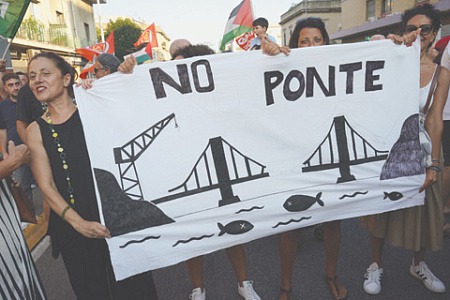
Approximately 10,000 people have marched through the streets of Messina, Sicily, in a powerful demonstration against a highly contentious government plan to construct a bridge connecting the island to the Italian mainland. Protesters from a wide array of political backgrounds, from Christian activists to pro-Palestinian advocates, united under the clear and simple slogan: ‘No to the bridge’.
The protest comes as the Italian government, having approved the ambitious project without consulting local communities, prepares to commence preliminary work in September. Officials in Rome have lauded the planned bridge as a future ‘engineering marvel of the world,’ a symbol of national pride and progress that would finally create a physical link to Sicily.
In a remarkable geopolitical maneuver, the government has also framed the massive infrastructure project as a strategic move against Russia. Funding for the bridge has been controversially allocated under Italy’s mandatory defense spending commitments as a NATO member, presenting the construction as a contribution to the alliance’s security posture and strategic interests.
For the residents of Sicily, however, the abstract threat of Russia pales in comparison to more immediate concerns. The opposition is fueled by profound fears of irreversible environmental damage to the delicate ecosystem of the Strait of Messina. Furthermore, the construction plan necessitates the forced eviction of numerous local residents from their homes, a reality that has galvanized the community into action and overshadowed any purported geopolitical benefits.
